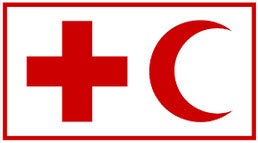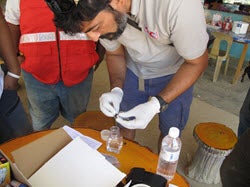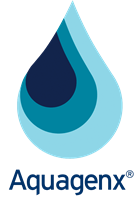IFRC Uses CBT Kit for Disaster Response Efforts
in Malaysia Following Severe Flooding

Challenge
In December 2014, Malaysia experienced the worst flooding it had in decades. As is common after severe flooding, there was a high risk of waterborne diseases, including those caused by E. coli bacteria. The International Federation of Red Cross and Red Crescent Societies (IFRC) and its partner Malaysia Red Crescent Society provided disaster response assistance with flooding in the northeastern corner of Malaysia. Remote villages had no easy access to laboratories, specialized personnel or equipment for water quality testing. The IFRC needed a portable water quality test specifically for E. coli to test samples on-site in remote locations.
Solution
 The IFRC deployed the Aquagenx Compartment Bag Test (CBT) in Malaysia to help provide disaster response assistance by monitoring drinking water for fecal contamination. They chose the CBT because it doesn’t require electricity and other equipment, and specifies E. coli. The IFRC tested water at taps and from respective sources on-site in remote locations to indicate if affected people were drinking contaminated water and exposed to levels of health risk.
The IFRC deployed the Aquagenx Compartment Bag Test (CBT) in Malaysia to help provide disaster response assistance by monitoring drinking water for fecal contamination. They chose the CBT because it doesn’t require electricity and other equipment, and specifies E. coli. The IFRC tested water at taps and from respective sources on-site in remote locations to indicate if affected people were drinking contaminated water and exposed to levels of health risk.
Test Results
Water samples taken from unprotected spring catchments generally indicated a high risk of E. coli bacteria and fecal contamination. Samples from boreholes were of a lower to negligible health risk.
Conclusion
The IFRC reports the CBT was ideal for disaster response efforts and very simple to use. They easily explained sampling procedures for the CBT to their partners. Scoring test results was simplified due to the CBT’s visual, color-coded scoring method. Quantified test results were obtained in 24 to 36 hours without waiting for lab access and analysis, The IFRC demonstrated to communities that drinking contaminated water presents health risks to everyone.
Jay Matta, Water and Sanitation Coordinator for Asia Pacific for IFRC, says, “The CBT lets us mobilize resources and make informed decisions very quickly in the face of a disaster. We will continue to use the CBT in other disaster settings because of its ease of use and handling, low cost and efficiency.”
